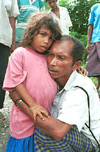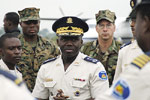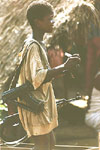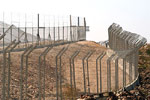
and human security
 |
 |

|
- 2006 - 2005 - 2004 - 2003 - 2002 |

|

|

|
 |
 |
HUMAN RIGHTS AND RELIGIOUS FREEDOM The WCC Commission of the Churces in International Affairs (CCIA) has a long history of involvement in the struggle for human rights and religious freedom. This involvement is based on the conviction that God wills a society in which all can exercise full human rights. All human beings are created in God’s image, equal and infinitely precious in God’s sight. Since the Uppsala Assembly in 1968, the WCC has engaged in support of the human rights struggles of the churches and related organizations everywhere, but with special emphasis on countries suffering from military dictatorships in Africa, Asia and Latin America. Church-based human rights movements became major forces for justice and democratization in their societies and in defence of their people. At the United Nations, the WCC has facilitated the testimony of victims themselves, human rights defenders and church leaders. The Council was instrumental in assisting in the drafting of important new international standards of human rights, such as to ban the use of torture and to provide support for victims. It also called for creation within the UN Commission on Human Rights of a working group on torture. The CCIA also contributed to new “third generation” standards on human rights and militarism, on people’s rights to peace and social development, and to new enforceable standards in the field of religious freedom and tolerance. |
|
||||||
Today, the WCC International Affairs team seeks to build and strengthen the capacity of the churches in this area, and thus to ensure respect for human rights through monitoring, analysis and education, and to create awareness for human rights mechanisms, instruments and through international solidarity and advocacy.
This is also done by convening meetings with human rights officers and experts in member churches and ecumenical partners, and visits to critical human rights situations to further develop strategic human rights work.
The WCC uses its vast network of churches around the globe to feed into international forums, bringing the reality of specific human rights violations on the ground and the root causes of such violations to the global attention. This is done regularly by facilitating access of local-level testimonies and interventions from the churches at the UN Commission on Human Rights, and helping submissions of alternate national human rights reports to the UN Committee and treaty bodies as part of the advocacy efforts at the global level.
Religious freedom
The WCC/CCIA has from the very beginning had religious liberty as its central concern. Defence and promotion of religious liberty continues to be an integral part of the mandate of the Council. Over the years, the progressive evolution in the ecumenical understanding of religious liberty has been augmented and refined by the variety of concrete experiences of its member churches around the globe.
The WCC through its CCIA made a valuable contribution in the drafting of the provision of Article 18 on religious freedom and liberty of the Universal Declaration of Human Rights.
The right to religious freedom continues to be a major concern of member churches and the WCC. The exercise of this right has always reflected the great diversity of convictions that exist in the world. In the present context, where religion has come to play an increasingly central role in civil and political life, the question being raised is: Is this right absolute? Or is it to be qualified in its application given the context of plural societies?
“Religious liberty should never be used to claim privileges. For the church, this right is essential so that it can fulfill its responsibilities which arise out of the Christian faith. Central to these responsibilities is the obligation to serve the whole community.” 5th WCC Assembly, Nairobi 1975.
Looking to the future
Building on these six decades of strong commitment for human rights, there are three main areas that the churches will be called to put more emphasis on in the near future.
- The first significant challenge for churches is to analyse the current security emphasis to counter terrorism, that will obviously lead to an increase in violations of fundamental human rights, and to determine how best to address the situation.
- The second is in the area of economic and social rights. The dominant economic model, based on a globalized free market, has forced millions of people into meaningless jobs, often under inhuman working conditions, casual labour with no insurance of continuing subsistence, massive unemployment, poverty and despair. The struggle for economic justice – social, economic and cultural rights – will remain a major challenge for churches in the future.
- The third is related to the issue of intolerance. In recent years, religious, ethnic and national discrimination, intolerance and violence have been a major contributor to repression and violation of human rights. There is a need to acknowledge, guarantee and protect rights of religious minorities; to determine the degree to which religious freedom can be considered an absolute right in plural society; and the role of religion in conflict and in inter-religious dialogue.
CCIA believes that international advocacy for peace, justice and human rights must be founded on a vibrant movement and struggle on the ground. This makes it obligatory for the Council to nurture support and sustain its vast network of churches in the regions that are involved in critical human rights situations.




